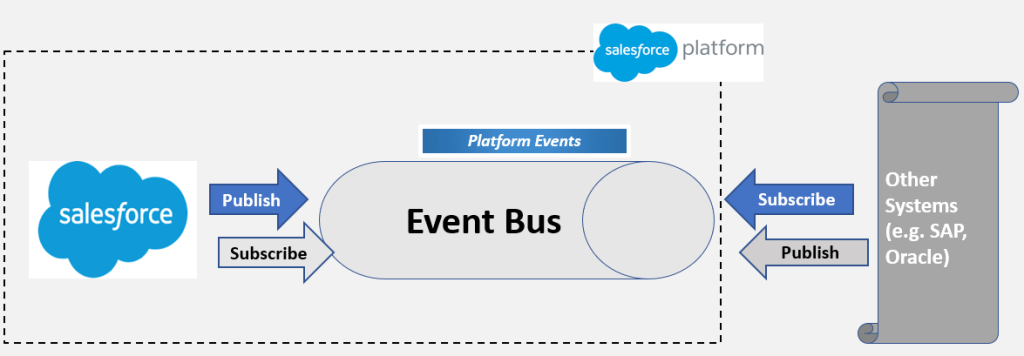Platform Event Flow in Salesforce

Introduction:
In the world of Salesforce automation, Platform Event Flow stands as a pivotal feature, often unnoticed yet powerful. It’s a tool that bridges various components within Salesforce and connects external systems, enabling real-time data processing and responsiveness. In this blog post, we’ll explore the ins and outs of Platform Event Flow, its applications, and how it can revolutionize the way businesses operate within the Salesforce ecosystem.
What is Platform Event Flow?
Platform Event Flow is a Salesforce feature that allows users to define, publish, and subscribe to events within the Salesforce platform. This flow is triggered by specific events rather than traditional record changes, making it uniquely suited for real-time applications. Unlike other Salesforce Flows, Platform Event Flow excels in scenarios where immediate action is required based on external triggers.
The Technical Mechanism Behind the Scenes
Platform Event Flow operates on a publish-subscribe model. Events are defined within Salesforce, and when these events occur (either from within Salesforce or from an external source), they publish a message. The Flow is then triggered, executing predefined actions in response. The process of creating these events and subscribing to them allows for a highly customizable and responsive automation system.
Real-World Applications:
- Customer Service Alerts: Imagine a scenario where customer issues posted on social media automatically create support tickets in Salesforce. Platform Event Flow makes this possible by monitoring social media channels and triggering actions in Salesforce in real-time.
- Inventory Management: In retail, keeping inventory levels accurate is crucial. Platform Event Flow can update Salesforce records instantly when sales occur in an external point-of-sale system, ensuring inventory data is always up-to-date.
- IoT Device Integration: For businesses using IoT devices, Platform Event Flow can process data from these devices. For example, sensors in a factory could trigger maintenance workflows in Salesforce the moment they detect equipment anomalies.
Integrating with External Systems:
A key strength of Platform Event Flow is its ability to integrate Salesforce with external systems. An example is integrating Salesforce with an ERP system for real-time data syncing. When a sales order is updated in Salesforce, it immediately triggers an update in the ERP system, streamlining operations and reducing errors.
Navigating the Limitations:
While powerful, Platform Event Flow is not without limitations. Understanding these – such as limits on the number of events that can be processed – and adhering to best practices like efficient event design and thorough testing, can ensure smooth operation.
A Real-Life Success Story:
Consider a case study where a company implemented Platform Event Flow to automate its customer feedback process. The company was able to capture customer feedback from various channels and aggregate it in Salesforce instantly, significantly improving response times and customer satisfaction.
Conclusion:
Platform Event Flow in Salesforce is a game-changer for businesses looking for real-time responsiveness and integration capabilities. By leveraging this tool, organizations can enhance their operations, respond quicker to market demands, and maintain a competitive edge. Understanding and implementing Platform Event Flow can lead to more efficient processes and improved data integrity, making it an invaluable asset in the Salesforce arsenal.
Become an expert in Salesforce, join in our real-time project based Salesforce Course, enroll for free demo today!

